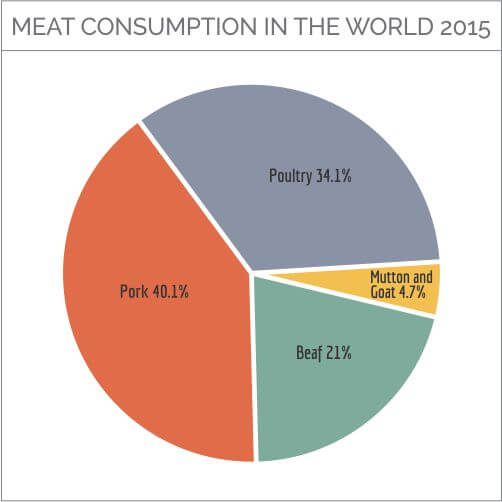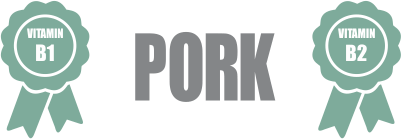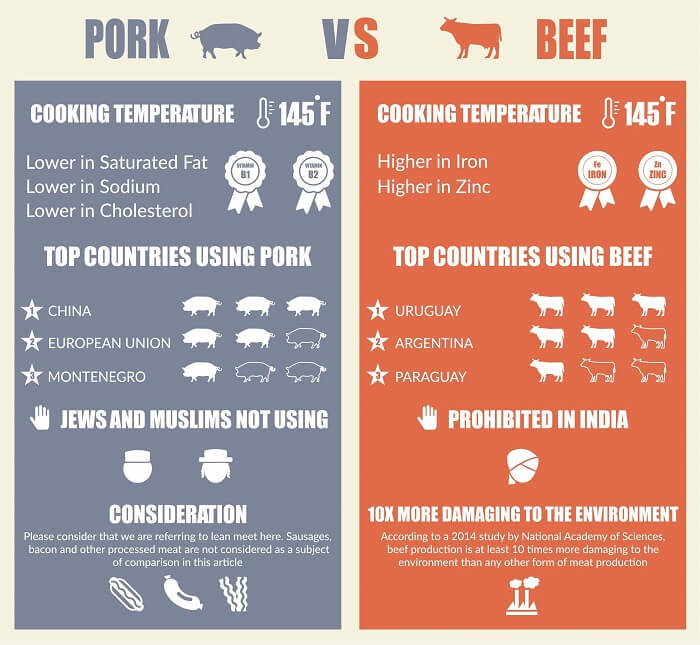Which Is Better Beef Gelatin or Pork Gelatin

vs

Introduction
Pork vs Beef. Which is healthier to eat and in which condition? These are the sort of questions you may ask yourselves at least once in a while. Then you suddenly remember something your grandma kept saying and go with the answer. We decided to dig deeper and explore the differences from a more scientific perspective.
Considerations
Please consider that we are referring to lean meet here. Sausages, bacon and other processed meat are not considered as a subject of comparison in this article. Comparing beef with pork sausage for instance, might result in conclusions very different from the ones that we'll have here.
Bans and Religion
Several religions ban the consumption of pig meat altogether. Although there are some mentions about not eating it in Christian Bible, the modern church allows eating it. However, most Jewish communities prohibit it. Jewish dietary law "Kashrut"states that only the animals which chew their own cud and have divided hoofs should be eaten by the followers of the religion. Pigs do not satisfy the second condition which puts them to the blacklist. Islam has its own list of prohibited foods called "Haram" based on a similar approach which puts pork out of the permitted food list. Beef on the other hand is a respected creature of God in Hinduism. There are laws in India prohibiting the slaughtering of cows which vary by state. You can go to jail from 6 months up to 10 years depending on your state if you slaughtered a cow in India. 
Consumption comparison
Not seeing any scientific evidence in the old religious customs we can go on with our analysis and look at the usage statistics. The data of USDA's Foreign Agricultural service states that pork consumption in the world is twice as big as beef consumption. However, looking at US results separately reveals approximately equal results, with beef being ahead by a small amount. Pork seems to be popular in countries like China, European Union, Taiwan, South Korea, Montenegro and Vietnam. Beef is extremely popular in Uruguay and Argentina, followed by Paraguay, United States and Brazil. Among the countries with low consumption of pork are India, Nigeria, Philippines Thailand and Iran. (the data we are referring is for year 2015). 
Nutrition comparison
It's time to discuss the most interesting and scientific part of the comparison - nutrition. In order to nutritionally compare two foods we have to fix their states, i.e cooked or raw, salted or not etc. We chose these two similar states of the foods
Beef, ground, 85% lean meat / 15% fat, patty, cooked, broiled
Pork, fresh, loin, whole, separable lean and fat, cooked, broiled
Both are cooked and broiled and both contain some usual share of fat. So with this selection we have pork winning in 3 important categories; namely, Lower in Saturated Fats, Lower in Cholesterol and Lower in Sodium. Though the difference is not so big, the winner takes it all anyway. Besides, it is lower in calories and overall fats. The protein quality of it is also higher, because the quantity of all amino acids is higher.
Vitamins comparison
Let's move to vitamins now. Pork is drastically richer in B1 , fairly richer in B2 and E. Considered as very important lately, vitamin D is completely absent from Beef while Pork has 13% of daily value in just 100 grams. On the other hand Beef is radically higher in Vitamin B12 
Minerals comparison
What about MInerals? Here we have a slightly different picture. Beef is radically higher in Iron and Zinc. Pork is slightly better in Magnesium, Potassium, Phosphorus, Choline while Beef beats pork in Copper and Manganese. 
Cholesterol
Ground beef with 15% fat has a cholesterol content of 80, while the cholesterol content of fresh pig's whole loin is 88. The highest level of cholesterol in both beef and pork is found in the liver.
However, cholesterol content can differ depending on what part of the meat it is. The highest amount of cholesterol in beef meat is found in a corned beef brisket with 98mg per 100g. The lowest is found in strip steak (55mg per 100g).
Ground pork with 28% fat has 100mg of cholesterol per 100g. Pulled pork contains only 35mg of cholesterol in a 100g serving.
Overall, pork tends to have lower cholesterol levels than beef, but it all depends on the type of meat.
Thus, nutrition comparison summary is in a way on the side of pork. In any case it's definite that it is not worse by the results of surface nutritional analysis.
Which is safer for babies ?
Actually, many forums still recommend not giving pork to children at the age when they can freely eat beef. Other blogs insist that it is at least as healthy as beef is and recommend it for babies as early as 7 or 8 months old. Looking at the most official source - USDA's recommendations for babies we can see that both foods are listed together without any reservations and warnings, and both are safe to eat starting from the same age.
What makes some think Pork is bad ?
What makes some people think that pork is evil then ? Why is it prohibited in many religions and why many of us do not give it to our children for a long time ? There are various statements that some resources keep stating. Please find the more common ones below.
1)Some are referring to processed pork , such as sausages, bacon or salami, while talking about it.
Many processed forms may really be dangerous for health but we are not discussing them now and are talking about lean pork such as tenderloin, sirloin chops or top loin chops.
2) Does pork contain more viruses toxins or parasites?
As we all know they all die if you cook them with high enough temperature. For that USDA has defined its recommended temperatures for cooking various types of meat.
More importantly the recommended temperature is the same for both foods. It's 145 °F for both, and 160°F for ground meat. So whatever viruses these types of red meat have, they all die at the same temperature according to scientists.
3) Pig is a dirty animal and eats whatever it wants.
This partially depends on how the cow, the pig or the chicken are handled on what they are being fed. Grass fed beef really differs from not grass fed one which is a topic for a future article. We should always think of how the animal was fed regardless of the type of meat. And finally, after cooking with USDA recommended temperature we kill all the viruses and parasites as covered in the previous headline.
Environment impact
National Academy of Sciences published a study in February 2014, which revealed that beef is extremely damaging to the environment. The study was comparing the environmental cost spent to feed and raise animals which are used as protein sources for humans. It showed that cows need around 28 times more land than pork or poultry, require 11 times more irrigation, produce much more greenhouse gas and consume lot more nitrogen. To summarize, cowis damaging the environment 10 times more than any other protein source.
Summary
It is very important to choose the right cuts of both foods and not use proceed ones. When comparing good cuts of both, pork appears to be slightly better nutritionally, except for the beef being richer in Iron and Zinc. Beef is consumed two times less in the world overall. Various conversations about pork being more "dirty" and full of viruses seem to have no scientific evidence, assuming it is cooked using USDA's recommended temperature. It's safe to give pork to children and eat it as long as your religious views allow it. Beef is drastically more damaging to the environment. Enjoy and share the comparison infographic and in-depth vitamin/mineral comparison below. 
Infographic

Mineral Comparison
Mineral comparison score is based on the number of minerals by which one or the other food is richer. The "coverage" chart below show how much of the daily needs can be covered by 300 grams of the food
![]()
5
:
3
![]()
Contains more Magnesium +33.3%
Contains more Phosphorus +24.2%
Contains more Potassium +33%
Contains less Sodium -13.9%
Contains more Iron +198.9%
Contains more Zinc +164%
Contains more Copper +16.4%
Contains more Magnesium +33.3%
Contains more Phosphorus +24.2%
Contains more Potassium +33%
Contains less Sodium -13.9%
Contains more Iron +198.9%
Contains more Zinc +164%
Contains more Copper +16.4%
Vitamin Comparison
Vitamin comparison score is based on the number of vitamins by which one or the other food is richer. The "coverage" chart below show how much of the daily needs can be covered by 300 grams of the food
![]()
7
:
5
![]()
Contains more Vitamin E +141.7%
Contains more Vitamin D +∞%
Contains more Vitamin C +∞%
Contains more Vitamin B1 +1806.5%
Contains more Vitamin B2 +82.4%
Contains more Vitamin B6 +21.5%
Contains more Vitamin A +28.6%
Contains more Folate +80%
Contains more Vitamin B12 +277.1%
Contains more Vitamin K +∞%
Equal in Vitamin B3 - 5.378
Equal in Vitamin B5 - 0.658
Contains more Vitamin E +141.7%
Contains more Vitamin D +∞%
Contains more Vitamin C +∞%
Contains more Vitamin B1 +1806.5%
Contains more Vitamin B2 +82.4%
Contains more Vitamin B6 +21.5%
Contains more Vitamin A +28.6%
Contains more Folate +80%
Contains more Vitamin B12 +277.1%
Contains more Vitamin K +∞%
Equal in Vitamin B3 - 5.378
Equal in Vitamin B5 - 0.658
Which food is preferable for your diet?
![]()
![]()
is better in case of low diet
 |  | |
| Low Fats diet | | |
| Low Carbs diet | Equal | |
| Low Calories diet | | |
| Low glycemic index diet | Equal | |
People also compare
Vitamin and Mineral Summary Scores
The summary score is calculated by summing up the daily values contained in 300 grams of the product. Obviously the more the food fulfills human daily needs, the more the summary score is.
Vitamin Summary Score
56
![]()
52
![]()
Mineral Summary Score
37
![]()
55
![]()
Macronutrients Comparison
Macronutrient comparison charts compare the amount of protein, total fats, and total carbohydrates in 300 grams of the food. The displayed values show how much of the daily needs can be covered by 300 grams of food.
Protein
164%
![]()
156%
![]()
Carbohydrates
0%
![]()
0%
![]()
Fats
64%
![]()
71%
![]()
Comparison summary
Which food contains less Sodium?
![]()
Pork contains less Sodium (difference - 10mg)
Which food is lower in Cholesterol?
![]()
Pork is lower in Cholesterol (difference - 8mg)
Which food is lower in Saturated Fat?
![]()
Pork is lower in Saturated Fat (difference - 0.665g)
Which food is cheaper?
![]()
Pork is cheaper (difference - $1.2)
Which food contains less Sugar?
?
The foods are relatively equal in Sugar (0 g)
Which food is lower in glycemic index?
?
The foods have equal glycemic indexes (0)
Which food is richer in minerals?
?
It cannot be stated which food is richer in vitamins. See the charts below for detailed information. See the charts below for detailed information. See the charts below for detailed information.
Which food is richer in vitamins?
?
It cannot be stated which food is richer in vitamins. See the charts below for detailed information. See the charts below for detailed information. See the charts below for detailed information.
Source: https://foodstruct.com/compare/pork-vs-beef

0 Response to "Which Is Better Beef Gelatin or Pork Gelatin"
Post a Comment